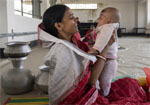Baby formula makers still violating global marketing rules – study
 More than half of the parents and pregnant women from eight countries, including Bangladesh, say they have been targeted with marketing in breach of international standards on infant feeding practices.
More than half of the parents and pregnant women from eight countries, including Bangladesh, say they have been targeted with marketing in breach of international standards on infant feeding practices.
A new study by the World Health Organization and UNICEF, which draws on interviews with parents, pregnant women and health workers also from China, Mexico, Morocco, Nigeria, South Africa, the United Kingdom and Vietnam, revealed the findings.
The report titled “How marketing of formula milk influences our decisions on infant feeding”, is the largest of its kind and uncovers systematic and unethical marketing strategies used by the formula milk industry, according to a press release issued by UNICEF in this regard.
In Bangladesh, 65 percent of women exclusively breastfeed their babies up until five months old, the highest in all the countries surveyed, the release reports.
Although women in Bangladesh are less directly exposed to traditional marketing of formula milk compared to other countries, many health professionals, including doctors, are influenced by the marketing and view breastmilk as inadequate, it adds.
Nearly 60 percent of mothers have been recommended a formula milk product by a health professional. As a result, despite 98 percent of pregnant women expressing a strong desire to breastfeed, only 65 percent go on to do so exclusively after giving birth, it also reads.
“The overwhelming majority of women in Bangladesh want to breastfeed, yet they often do not receive the support they need. Instead, marketing of formula milk sows the seeds of fear and doubt. This can only be overcome when mothers are given information based on science, not profits,” said Veera Mendonca, deputy
representative of UNICEF Bangladesh.
“WHO’s guidance on breastfeeding to the infant and young children, and Breast Milk Substitute (BMS) Code monitoring is very clear. It is vital to ensure that breastfeeding mothers do not get targeted by the industry and their marketing and promoting of formula-feeding do not jeopardize breastfeeding by feeding
mothers,” the release quotes Dr Bardan Jung Rana, WHO representative to Bangladesh, as saying.
“The growing aggressive marketing, especially during this pandemic, highlights the need for robust implementation, stronger enforcement, and monitoring of Bangladesh national code legislations to protect families from false claims about the safety of breast-milk substitutes,” added Dr Bardan Jung Rana.
The study surveyed 8,500 parents and pregnant women, and 300 health workers in cities across Bangladesh, China, Mexico, Morocco, Nigeria, South Africa, the United Kingdom and Viet Nam.
Of them, exposure to formula milk marketing reaches 84 percent of all women surveyed in the United Kingdom; 92 percent of women surveyed in Viet Nam and 97 percent of women surveyed in China, increasing their likelihood of choosing formula feeding.
